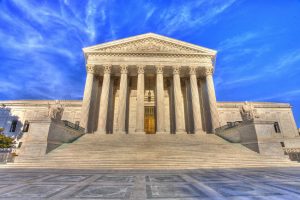 New York became the latest US state to move forward with introducing sports betting regulations within its borders. The new piece of legislation was introduced on March 7 and its purpose is to legalize sports betting activities on the territory of the state. The bill is labeled S7900 and was proposed by State Senator John Bonacic, who also occupies the position of a chairman of the Senate’s Racing, Gaming and Wagering Committee.
New York became the latest US state to move forward with introducing sports betting regulations within its borders. The new piece of legislation was introduced on March 7 and its purpose is to legalize sports betting activities on the territory of the state. The bill is labeled S7900 and was proposed by State Senator John Bonacic, who also occupies the position of a chairman of the Senate’s Racing, Gaming and Wagering Committee.
If the new bill gets signed into law, it is to introduce a number of amendments to the existing state legislation that pertain to pari-mutuel betting, breeding, and racing. Once the amendments are enforced, they are to allow for legal sports betting and single-game wagering at gambling venues, betting parlours, and racetracks. Mobile wagering would also be permitted should the bill come into effect.
Another key point of the newly introduced bill has to do with the taxation of authorized sports betting operators. The bill proposes operators offering such services to pay a flat tax amounting to 10.5% of their gross gambling revenue. This includes the so-called integrity fee the operators would have to pay to major sports leagues like the MLB and the NBA as they also are looking to profit from the potential sports betting legalization.
The said integrity fee normally involves a 0.25% tax imposed on the handle of sportsbooks. Handle is not to be mistaken for revenue as it represents the overall amount the customers of a given sportsbook have wagered within a specific period.
Some would argue the leagues deserve to be paid this integrity fee as, after all, the contests their teams are involved in are the foundation of sports betting. However, paying an integrity fee may work to the disadvantage of the state as it will take away from the taxes that otherwise would go to the state’s coffers.
Moreover, major leagues like the MLB and the NBA insist on collecting 1% of the tax handle from sports betting instead of the 0.25% proposed by the introduced piece of legislation. Another provision of the proposed bill would enable the sports leagues to determine where the sports betting data in New York could come from.
The bill also differs from its draft in that it contains provisions for what is worded as “global risk management” of the authorized sports betting operations within the state’s borders. This has to do with managing the risks related to sports betting operations, such as the setting and adjustments of the points spreads, the odds, and the betting lines of accumulator bets. Lay-off bets are also broached upon in this section.
The Supreme Court’s Pending Decision is Crucial to the Passing of the Bill
 One of the key factors that would further sports betting legalization on the territory of New York has to do with the outcome of a sports betting case against the National Collegiate Athletic Association (NCAA) that the state of New Jersey took to the Supreme Court. The legal dispute has to do with a federal ban that prohibits sports betting operations across the country, the only exception being a select few states, namely Nevada, Delaware, Montana, and Oregon.
One of the key factors that would further sports betting legalization on the territory of New York has to do with the outcome of a sports betting case against the National Collegiate Athletic Association (NCAA) that the state of New Jersey took to the Supreme Court. The legal dispute has to do with a federal ban that prohibits sports betting operations across the country, the only exception being a select few states, namely Nevada, Delaware, Montana, and Oregon.
The dispute was taken to the Supreme Court by the New Jersey Senator Chris Christi and questions PASPA (short for Professional and Amateur Sports Protection Act), which applies on a federal level. It prevents the different states from regulating and licensing the provision of sports betting services. If the Supreme Court takes the side of the state of New Jersey, this would allow for the legalization and regulation of sports betting in other individual states, apart from the four ones mentioned above. The Supreme Court is expected to come up with a decision on the dispute in the upcoming months.
Louisiana and Missouri are Also Pushing for Sports Betting Legalization
 New York is only one of the few states that are currently pushing forward for introducing their own sports betting legislation. The state of Louisiana recently introduced two different bills (called SB322 and SB266) which aim at expanding its existing sports betting and online gambling legislation.
New York is only one of the few states that are currently pushing forward for introducing their own sports betting legislation. The state of Louisiana recently introduced two different bills (called SB322 and SB266) which aim at expanding its existing sports betting and online gambling legislation.
The first one, SB322, aims at legalizing and regulating interactive gambling within Louisiana’s borders. The second one, SB266, pertains specifically to sports betting legalization. If it passes, SB266 is to allow Louisiana residents to place wagers on the outcomes of sporting events with operators that would be regulated by the Louisiana Gaming Control Board. Louisiana Senator Daniel Martini has previously expressed an opinion that SB266 is more likely to get signed into law.
Missouri has also jumped on the sports-betting bandwagon by introducing a bill that is similar to Louisiana’s SB266. In February 2018, the state’s Senator Caleb Rowden introduced a piece of legislation called State Bill 1009 which seeks to authorize the provision of sports betting in Missouri. The bill was sponsored by Senator Rowden himself. At the time, Senator Rowden commented that the passing of the new bill would bring in extra revenue for the state, which is yet another positive of sports betting regulations.



















